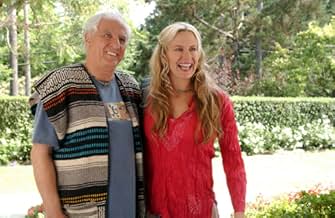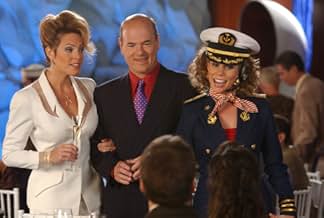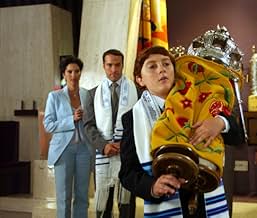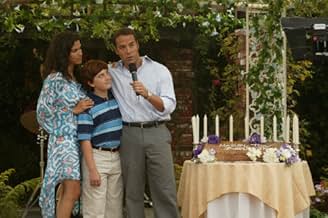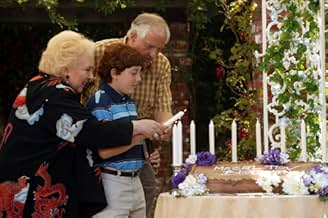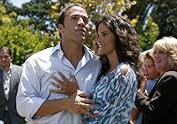IMDb रेटिंग
5.4/10
3.4 हज़ार
आपकी रेटिंग
अपनी भाषा में प्लॉट जोड़ेंA 13-year-old boy uses his upcoming bar mitzvah to reconcile the strained relationship between his father and grandfather.A 13-year-old boy uses his upcoming bar mitzvah to reconcile the strained relationship between his father and grandfather.A 13-year-old boy uses his upcoming bar mitzvah to reconcile the strained relationship between his father and grandfather.
- पुरस्कार
- 2 कुल नामांकन
Marc John Jefferies
- Tim
- (as Marc John Jeffries)
Britt Robertson
- Ashley Grunwald
- (as Brittany Robertson)
फ़ीचर्ड समीक्षाएं
Look, I am 18 and Jewish. I saw this with 2 of my closest also Jewish friends. Of the three only one of us had a barmitzva. But none the less I am convinced that you will find this movie funny if you are Jewish. This was the conclusion my friends and I came up with. This movie has a target audience, and that is the audience that to any extent of the way can relate to it. Its a little slow and at some times feels as if you are missing a scene. Nevertheless the jokes are there, and I did laugh. As a coming of age story I would give it a 5 but as a Jewish comedy I would give it a 9, so that brings us to a seven. Jermey is funny as always and a couple camio roles that I don't wish to reveal really brings the whole movie together and at the same time has you brawling in your seats.
Interesting thing about having seen 'Keeping Up with the Steins' on a Sunday at Fallbrook in the Valley - there was a fieldtrip of some school that had seen fit to come see the film as a group, then hold a sort of Q&A in the lobby. Ages of the folks in attendance ranged from 12 to about 60 and over. I love being in a full theatre when going to a film, particularly a comedy as you'll get laughs out of people that become infectious and actually make seeing the film that much better of an experience.
Another interesting thing about the 'Steins' film: while Jeremy Piven and the young hero of the film are the driving characters, the lasting memories of a film-goer actually belong to Gary Marshall & Doris Roberts. The backstory of their relationship, how it affected Piven, and how they've let by-gones be by-gones while Piven clutches to his old grudges is beautifully and deftly handled by the director. Marshall delivers the father figure as likable to an audience as the characters he created on network television back in the 70's.
One more interesting thing about the 'Steins': you don't have to be Jewish to appreciate the humor, you just have to recognize the strengths and failings of every human being represented in these characters.
Another interesting thing about the 'Steins' film: while Jeremy Piven and the young hero of the film are the driving characters, the lasting memories of a film-goer actually belong to Gary Marshall & Doris Roberts. The backstory of their relationship, how it affected Piven, and how they've let by-gones be by-gones while Piven clutches to his old grudges is beautifully and deftly handled by the director. Marshall delivers the father figure as likable to an audience as the characters he created on network television back in the 70's.
One more interesting thing about the 'Steins': you don't have to be Jewish to appreciate the humor, you just have to recognize the strengths and failings of every human being represented in these characters.
Don't be misled by the title, which suggests a plot reminiscent of some awful reality show such as "Bridezillas" or "My Super Sweet Sixteen," in which a pretentious family with more money than taste turns a family celebration into a vulgar carnival. The original title of this film was "Lucky 13;" whoever decided to change it did the movie a disservice. It's really a sweet little story about a boy who tries to reconcile his embittered father with his paternal grandfather, who disappeared from his family's life for many years and has only recently reappeared. This all takes place during the boy's impending bar mitzvah, the preparations for which are mildly amusing. Garry Marshall's especially entertaining, and touching, as the grandfather. Nothing's really new here, and while the material may not have been enough to sustain a theatrical film, it's a nice little time-waster if it shows up on TV. If you enjoyed "My Big Fat Greek Wedding," you're likely to find this to your liking as well.
This is a coming-of-age story with a twist. There is more than one person coming-of-age.
In a nutshell, it is the story of an angst-ridden thirteen year old boy whose troubles are doubled by his pending bar mitzvah.
His father (Jeremy Piven) is a Hollywood agent intent on turning the bar mitzvah into a recruiting event to keep and grow his client base. This is complicated when his former partner, played by Larry Miller, throws a mega bar mitzvah for his own son, with the same intention in mind.
Piven's angst at creating the perfect bar mitzvah/recruitment event is made worse by the arrival of his hippy-like father (Gary Marshall), who is attached to an early 40-something New Ager (Daryl Hannah) and teaching English to children on the Navajo reservation. I guess it's supposed to be funny, just looking at Marshall and Hannah. Marshall's and Piven's characters are estranged, the father having walked out on Piven and his mother (Doris Roberts) 26 years earlier.
We have an angst-ridden triangle between the three men: grandfather, father, and grandson. (The trinity in a Jewish story?) Indeed, the only struggles in the story are between men. The men have no plot difficulties or unresolved issues with the women, or the women with each other. Frankly, there is no way men can have unresolved issues and not emotionally involve the women in their lives. It's just not realistic, not even in a satirical sense.
I gave this film a "4" because of the story. It has a significant flaw. There is just no moment when I felt a human connection with the three men. I was shown all the events that led to the all-important climax, and then I felt nothing. It was like discovering I had swallowed a Chicklet instead of Viagra. No emotion. No "ah ha!" moment. I was more concerned that there wasn't enough butter on my popcorn. And because I felt no emotional connection with or between the three men, I did not feel their catharsis. And that's a real problem for a coming-of-age film. There were a few nice moments between the grandfather and grandson, but that was it.
Not good.
Regardless of what several "mainstream press" critics wrote and to the writer's and director's credit, I didn't see one stereotype. There were a few undeveloped characters, caricatures really, but that, too, is the fault of the storytellers it's lazy, not malicious.
Why it happened this way, I have no idea. Maybe they were forced to cut the film strangely or leave out things they wanted put in, due to money constraints. It just doesn't work.
The acting was fine, featuring some of the best actors on television today. That made it marginally watchable. Maybe television is where this film should have been sold. I see this as a Starz film. Not quite HBO or Showtime material. IFC or Sundance will be its home in about six months.
I counsel the writer and director to learn from this experience. You have to flesh out your characters more and let us in on their inner struggles. Don't tell us. Show us. That's what makes drama and comedy work, especially on film. Make us as tense as the characters appear because of the conflicts within the situation, and then resolve the audience's and characters' tensions at the same time. To paraphrase Woody Allen, if it's a comedy, make us bend with the character; if it's a drama, make us break.
For example, don't match Richard Benjamin's Bill-O'Reilly-loving rabbi character with Marshall's tolerant grandfather, and do nothing with it. That could have been some very funny stuff as the two men synthesize their worldviews. Instead pffft. Nothing.
And finally, have a bigger theme something the audience can sink its teeth into. I'm still not quite sure what it is. (And I won't venture a guess, because I don't want to spoil the ending for anybody.) Go back and watch how Chaplin created and then unknotted tension in "City Lights", how Sam Woods did it in "A Night at the Opera", how Marshall did it in "The Flamingo Kid" (another coming-of-age story), or even how it's done in the simplest episode of Piven's "Entourage". Have somebody check the treatment and script thoroughly for theme, conflict and catharsis. Then try it again.
I don't want this to sound angry or mean-spirited. But the situation within the film was just lousy with potential for a better film. It was all wasted. And that's a shame.
In a nutshell, it is the story of an angst-ridden thirteen year old boy whose troubles are doubled by his pending bar mitzvah.
His father (Jeremy Piven) is a Hollywood agent intent on turning the bar mitzvah into a recruiting event to keep and grow his client base. This is complicated when his former partner, played by Larry Miller, throws a mega bar mitzvah for his own son, with the same intention in mind.
Piven's angst at creating the perfect bar mitzvah/recruitment event is made worse by the arrival of his hippy-like father (Gary Marshall), who is attached to an early 40-something New Ager (Daryl Hannah) and teaching English to children on the Navajo reservation. I guess it's supposed to be funny, just looking at Marshall and Hannah. Marshall's and Piven's characters are estranged, the father having walked out on Piven and his mother (Doris Roberts) 26 years earlier.
We have an angst-ridden triangle between the three men: grandfather, father, and grandson. (The trinity in a Jewish story?) Indeed, the only struggles in the story are between men. The men have no plot difficulties or unresolved issues with the women, or the women with each other. Frankly, there is no way men can have unresolved issues and not emotionally involve the women in their lives. It's just not realistic, not even in a satirical sense.
I gave this film a "4" because of the story. It has a significant flaw. There is just no moment when I felt a human connection with the three men. I was shown all the events that led to the all-important climax, and then I felt nothing. It was like discovering I had swallowed a Chicklet instead of Viagra. No emotion. No "ah ha!" moment. I was more concerned that there wasn't enough butter on my popcorn. And because I felt no emotional connection with or between the three men, I did not feel their catharsis. And that's a real problem for a coming-of-age film. There were a few nice moments between the grandfather and grandson, but that was it.
Not good.
Regardless of what several "mainstream press" critics wrote and to the writer's and director's credit, I didn't see one stereotype. There were a few undeveloped characters, caricatures really, but that, too, is the fault of the storytellers it's lazy, not malicious.
Why it happened this way, I have no idea. Maybe they were forced to cut the film strangely or leave out things they wanted put in, due to money constraints. It just doesn't work.
The acting was fine, featuring some of the best actors on television today. That made it marginally watchable. Maybe television is where this film should have been sold. I see this as a Starz film. Not quite HBO or Showtime material. IFC or Sundance will be its home in about six months.
I counsel the writer and director to learn from this experience. You have to flesh out your characters more and let us in on their inner struggles. Don't tell us. Show us. That's what makes drama and comedy work, especially on film. Make us as tense as the characters appear because of the conflicts within the situation, and then resolve the audience's and characters' tensions at the same time. To paraphrase Woody Allen, if it's a comedy, make us bend with the character; if it's a drama, make us break.
For example, don't match Richard Benjamin's Bill-O'Reilly-loving rabbi character with Marshall's tolerant grandfather, and do nothing with it. That could have been some very funny stuff as the two men synthesize their worldviews. Instead pffft. Nothing.
And finally, have a bigger theme something the audience can sink its teeth into. I'm still not quite sure what it is. (And I won't venture a guess, because I don't want to spoil the ending for anybody.) Go back and watch how Chaplin created and then unknotted tension in "City Lights", how Sam Woods did it in "A Night at the Opera", how Marshall did it in "The Flamingo Kid" (another coming-of-age story), or even how it's done in the simplest episode of Piven's "Entourage". Have somebody check the treatment and script thoroughly for theme, conflict and catharsis. Then try it again.
I don't want this to sound angry or mean-spirited. But the situation within the film was just lousy with potential for a better film. It was all wasted. And that's a shame.
This endearing movie is a coming of age film in an upper upper middle class family in a Jewish neighborhood in LA. Meet Benjamin Fiedler (Daryl Sabara) age 13. Ben has reached the age where he undergoes the bar mitzvahs ritual to mark the entrée to adulthood. Of course his friend Zachary Stein (Carter Jenkins)who precedes Ben warns "this doesn't mean you can drink or drive a car.
The Stern family threw a lavish affair with a movie theme based upon the Titanic. Ben's dad Adam Fielder decides the Fielders must outdo the splendor of the Sterns by renting out Dodger Stadium. Adam Fielder (Jeremy Piven) is not a little sore that his own bar mitzvahs was a subdued affair and that his father Irwin Fiedler (Garry Marshall) deserted the family.
Religion and the meaning of the rite has taken a back seat to the planning of an extravagant event. Enter grandpa Irwin who arrives a week early. As Dad bristles with a contempt grandma Rose (Doris Roberts) cannot bring herself to bear, grandpa with his ding-a-ling left-over hippie girlfriend Sacred Feather sets up his rusty RV on the driveway depreciating the property values.
Can Ben and Grandpa Irwin set the ceremony back on track?
There is an excellent performance of Richard Benjamin as Rabbi Schulberg.
While there is a gratuitous nudie scene when grandpa goes skinny dipping in the Fielder's pool with Sacred Feather, the film is excellent family comedy which speaks to a universal theme, the importance of simplicity and the eloquence of understatement. It is too bad more films are not made in this spirit.
The Stern family threw a lavish affair with a movie theme based upon the Titanic. Ben's dad Adam Fielder decides the Fielders must outdo the splendor of the Sterns by renting out Dodger Stadium. Adam Fielder (Jeremy Piven) is not a little sore that his own bar mitzvahs was a subdued affair and that his father Irwin Fiedler (Garry Marshall) deserted the family.
Religion and the meaning of the rite has taken a back seat to the planning of an extravagant event. Enter grandpa Irwin who arrives a week early. As Dad bristles with a contempt grandma Rose (Doris Roberts) cannot bring herself to bear, grandpa with his ding-a-ling left-over hippie girlfriend Sacred Feather sets up his rusty RV on the driveway depreciating the property values.
Can Ben and Grandpa Irwin set the ceremony back on track?
There is an excellent performance of Richard Benjamin as Rabbi Schulberg.
While there is a gratuitous nudie scene when grandpa goes skinny dipping in the Fielder's pool with Sacred Feather, the film is excellent family comedy which speaks to a universal theme, the importance of simplicity and the eloquence of understatement. It is too bad more films are not made in this spirit.
क्या आपको पता है
- ट्रिवियाWhile shooting this movie, Daryl Sabara was also studying for his own Bar Mitzvah. The Haftorah portion that his character chants in the movie was Sabara's actual Bar Mitzvah portion.
- गूफ़When Benjamin is reading his Haftorah at his Bar Mitzvah, he fails to say the required prayer that precedes it. Instead, he goes right into the Haftorah portion itself.
- भाव
Rose Fiedler: Shamu is Jewish?
- क्रेज़ी क्रेडिटIn the first set of end credits, Mark John Jefferies is listed as a cast member, but in the final comprehensive set, he is listed as Marc John Jeffries.
- साउंडट्रैकFreilach
Traditional
Performed and Arranged by Gregori Schecter's Klezmer Festival Band
Courtesy of Opus 1 Music Library
Under license from ARC Music
टॉप पसंद
रेटिंग देने के लिए साइन-इन करें और वैयक्तिकृत सुझावों के लिए वॉचलिस्ट करें
विवरण
- रिलीज़ की तारीख़
- कंट्री ऑफ़ ओरिजिन
- आधिकारिक साइटें
- भाषाएं
- इस रूप में भी जाना जाता है
- Lucky 13
- फ़िल्माने की जगहें
- उत्पादन कंपनियां
- IMDbPro पर और कंपनी क्रेडिट देखें
बॉक्स ऑफ़िस
- US और कनाडा में सकल
- $43,39,241
- US और कनाडा में पहले सप्ताह में कुल कमाई
- $6,21,000
- 14 मई 2006
- दुनिया भर में सकल
- $44,09,374
- चलने की अवधि1 घंटा 30 मिनट
- रंग
- ध्वनि मिश्रण
- पक्ष अनुपात
- 1.85 : 1
इस पेज में योगदान दें
किसी बदलाव का सुझाव दें या अनुपलब्ध कॉन्टेंट जोड़ें

टॉप गैप
By what name was Keeping Up with the Steins (2006) officially released in Canada in English?
जवाब






